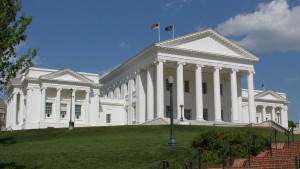 Virginia’s Governor Ralph Shearer Northam signed legislative bill HB638 last week. The bill is a major win for Virginia’s drone industry, making a move to prevent localities from enacting their own regulations and creating the problematic “patchwork quilt” of drone rules within the state.
Virginia’s Governor Ralph Shearer Northam signed legislative bill HB638 last week. The bill is a major win for Virginia’s drone industry, making a move to prevent localities from enacting their own regulations and creating the problematic “patchwork quilt” of drone rules within the state.
The law, which will go into effect on July 1, 2018, states: “§ 15.2-926.3. Local regulation of certain aircraft. No political subdivision may regulate the use of a privately owned, unmanned aircraft system as defined in § 19.2-60.1 within its boundaries. Nothing in this section shall permit a person to go or enter upon land owned by a political subdivision solely because he is in possession of an unmanned aircraft system if he would not otherwise be permitted entry upon such land.”
It’s a significant move for the state. Some local laws, like the one contested in court passed last year in Newton, MA, go so far that they effectively limit both recreational and commercial drones. That’s not only a problem for drone business, but for communities. Local lawmakers may not realize the benefits that medical drone delivery and other services could provide when they pass ordinances limiting drone use.
HB638 demonstrates the state’s commitment to bringing drones and other innovative technology to the state. It’s clear that lawmakers hope that industry-friendly legislation will have a direct effect on business: the bill also provides “That the Secretary of Commerce and Trade, in consultation with the Virginia Economic Development Partnership, shall study the impact of this act on unmanned aircraft research, innovation, and economic development in Virginia and report to the Governor and General Assembly no later than November 1, 2019.”
The bill does deal with the issue of privacy and stalking, also prohibiting a drone from flying within 50 feet of a personal dwelling “to coerce, intimidate, or harass another person,” or after being asked to desist. In addition, HB 638 clearly outlines the parameters of privacy: drone operators may not take recognizable images of another person without permission.
Those clarifications – like many drone laws, restatements of existing prohibitions against stalking, now naming drones specifically – shouldn’t cause a problem for legitimate operators. The prohibition against local laws, however, could make a significant positive impact. Drone operators everywhere are hoping that other states follow suit.

Miriam McNabb is the Editor-in-Chief of DRONELIFE and CEO of JobForDrones, a professional drone services marketplace, and a fascinated observer of the emerging drone industry and the regulatory environment for drones. Miriam has penned over 3,000 articles focused on the commercial drone space and is an international speaker and recognized figure in the industry. Miriam has a degree from the University of Chicago and over 20 years of experience in high tech sales and marketing for new technologies.
For drone industry consulting or writing, Email Miriam.
TWITTER:@spaldingbarker
Subscribe to DroneLife here.







[…] Virginia is such a well known hotspot for drone activity, it’s no surprise the Virginia Tech Drone Racing […]